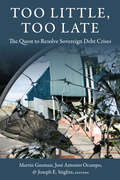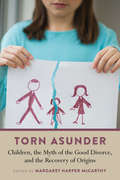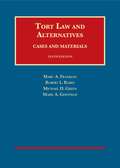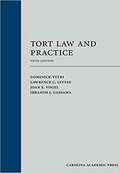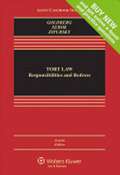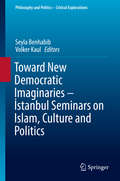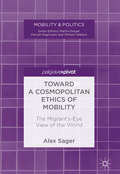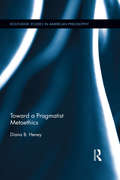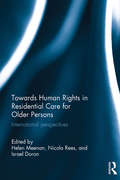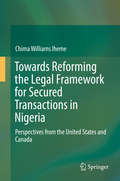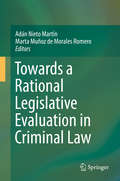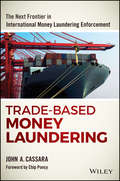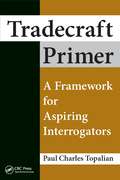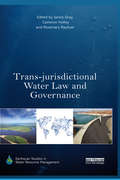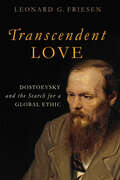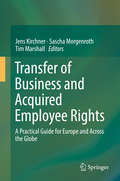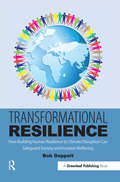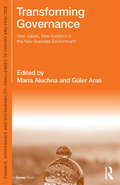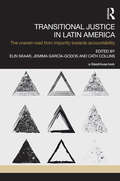- Table View
- List View
Too Little, Too Late: The Quest to Resolve Sovereign Debt Crises (Initiative for Policy Dialogue at Columbia: Challenges in Development and Globalization)
by Joseph E. Stiglitz José Antonio Ocampo Martin GuzmanThe current approach to resolving sovereign debt crises does not work: sovereign debt restructurings come too late and address too little. Though unresolved debt crises impose enormous costs on societies, many recent restructurings have not been deep enough to provide the conditions for economic recovery (as illustrated by the Greek debt restructuring of 2012). And if the debtor decides not to accept the terms demanded by the creditors, finalizing a restructuring can be slowed by legal challenges (as illustrated by the recent case of Argentina, deemed as "the trial of the century").A fresh start for distressed debtors is a basic principle of a well-functioning market economy, yet there is no international bankruptcy framework for sovereign debts. While this problem is not new, the United Nations and the global community are now willing to do something about it. Providing guidance for those who intend to take up reform, this book assesses the relative merits of various debt-restructuring proposals, especially in relation to the main deficiencies of the current nonsystem. With contributions by leading academics and practitioners, Too Little, Too Late reflects the overwhelming consensus among specialists on the need to find workable solutions.
Torn Asunder: Children, the Myth of the Good Divorce, and the Recovery of Origins
by Margaret McCarthyA timely unsettling of old "settled" questions surrounding divorce Amid the current nationwide debate over what "marriage" is, this book examines anew the nature and meaning of marriage from the standpoint of what adult children of divorce have actually experienced. Upholding the inextricable link between our personal identity and our origin in a union of two — and, more deeply, in the Fatherhood of God — the contributors to this volume reflect on the damage that divorce does to children, opening up important questions for all of us: What does it mean to be human? What does it mean to love and to marry? After decades of talk about the rights of adults to get a divorce and the benefits for children of an amicable split between parents (a so-called "good divorce"), these authors — theologians, philosophers, political scientists, lawyers, psychologists, sociologists, and cultural critics — effectively unsettle conventional opinion.
Tort Law
by Hylton Keith N.Tort Law: A Modern Perspective is an advanced yet accessible introduction to tort law for lawyers, law students, and others. Reflecting the way tort law is taught today, it explains the cases and legal doctrines commonly found in casebooks using modern ideas about public policy, economics, and philosophy. With an emphasis on policy rationales, Tort Law encourages readers to think critically about the justifications for legal doctrines. Although the topic of torts is specific, the conceptual approach should pay dividends to those who are interested broadly in regulatory policy and the role of law. Incorporating three decades of advancements in tort scholarship, Tort Law is the textbook for modern torts classrooms.
Tort Law (Sixth Edition)
by J Stanley EdwardsPrepare for your future career with TORT LAW, Sixth Edition. Engaging and easy-to-read, this practical book helps you develop the principles of tort law you need for a successful career as a paralegal.
Tort Law And Alternatives: Cases And Materials
by Michael Green Marc Franklin Robert Rabin Mark GeistfeldThis leading casebook covers all major aspects of tort law with expertly edited cases and original text. The principal focus of this book is the law of negligence, strict liability, and no-fault legislation as alternative approaches to compensating the victims of accidental harm and creating optimal incentives for safety. This Edition has restructured the chapter on intentional torts to facilitate its use to start off the course for those instructors desiring to do so. It also includes comprehensive chapters on products liability, damages and insurance, defamation, privacy, and economic torts. Notes and questions following principal cases are designed to supplement students’ knowledge about the subject matter of the case and related areas as well as to encourage them to think critically about judicial opinions and tort policy. This Tenth Edition reflects evolving developments in recent case law and legislative activity, as well as materials and commentary ranging from the two current Restatement projects on Liability for Economic Harm and Intentional Torts to continuing tort issues arising from the Internet.
Tort Law and Practice
by Dominick Vetri Lawrence C. Levine Joan E. Vogel Ibrahim J. GassamaTort Law and Practice provides a rich context for the study of Tort Law. Teachers and students consistently rate this book highly. This innovative casebook thoroughly develops the core torts principles, and has many unique features, such as: emphasis on contemporary cases while retaining the classic cases; use of problems (with model answers for teachers) to facilitate learning and application; variety of negligence duty issues to select from for classroom focus; balanced presentation of alternative points of view; inclusion of substantive and damages issues reflecting the diversity of U.S. society; summary of contents at the beginning of each chapter to help students keep the concepts in focus; boxed outline summaries and flow charts to facilitate learning; ethical issues in personal injury cases discussed in context; and practice materials included to help students understand the process.
Tort Law: Responsibilities And Redress (Aspen Casebook Ser.)
by John C. P. Goldberg Anthony James Sebok Benjamin Charles ZipurskyThe Fourth Edition of Tort Law: Responsibilities and Redress has been updated to reflect the very latest developments in tort law, including discussions of the draft provisions of the Third Restatement of Torts concerning intentional torts. The book also contains new "Check Your Understanding," "Big Thing" and "Did You Know?" text boxes along with a new user-friendly page layout. A set of PowerPoint slides on core cases and topics has been added to provide additional support to instructors. Features: Incredibly versatile, this text has been successfully adopted at a wide range of schools and can be taught from any intellectual or political perspective Presenting tort law as a complex but coherent whole, giving students a clear sense of what tort law is and what it does Grounded and pluralistic treatment recognizes the richness and diversity of the legal rules and concepts that make tort law what it is Comprehensive case mix presents current and classic cases, exposing students to diverse decisions from jurisdictions around the country, from lower courts to state high courts Progresses from negligence to intentional torts to products liability while permitting the professor to focus on an array of contemporary issues Extraordinarily clear introductory text and notes after cases are routinely cited by students as highly accessible, illuminating and relevant Exceptional support through a Teacher's Manual that gives detailed accounts of all the main cases and the issues they raise
Toward New Democratic Imaginaries - İstanbul Seminars on Islam, Culture and Politics
by Seyla Benhabib Volker KaulThis volume combines rigorous empirical and theoretical analyses with political engagement to look beyond reductive short-hands that ignore the historical evolution and varieties of Islamic doctrine and that deny the complexities of Muslim societies' encounters with modernity itself. Are Islam and democracy compatible? Can we shed the language of 'Islam vs. the West' for new political imaginaries?The authors analyze struggles over political legitimacy since the Arab Spring and the rise of Al Qaeda and ISIS in their historical and political complexity across the MENA (Middle East and North Africa) region. Distinguishing multiculturalism from interculturalism and understanding multiple modernities, philosophers in the volume tease out the complexities of civilizational encounters. The volume also shows how the Paris massacres or the Danish caricature controversy do not remain confined to Europe but influence struggles and confrontations within Muslim societies. Gender and Islam are addressed from a comparative perspective bringing into conversation not only the experience of different Muslim countries with Islamic law but also by analysing Jewish family law.
Toward a Cosmopolitan Ethics of Mobility: The Migrant's-Eye View of the World (Mobility & Politics)
by Alex SagerThis book proposes a cosmopolitan ethics that calls for analyzing how economic and political structures limit opportunities for different groups, distinguished by gender, race, and class. The author explores the implications of criticisms from the social sciences of Eurocentrism and of methodological nationalism for normative theories of mobility. These criticisms lend support to a cosmopolitan social science that rejects a principled distinction between international mobility and mobility within states and cities. This work has interdisciplinary appeal, integrating the social sciences, political philosophy, and political theory.
Toward a Cultural Politics of Climate Change: Devices, Desires and Dissent
by Johannes Stripple Harriet Bulkeley Matthew PatersonTowards a Cultural Politics of Climate Change provides a new perspective on how climate change matters in policy-making, business and everyday life. It argues that the work of low carbon transitions takes place through the creation of devices, the mobilisation of desires, and the articulation of dissent. Using case studies from the US, Australia, and Europe, the book examines the creation and contestation of new forms of cultural politics - of how a climate-changed society is articulated, realized and contested. Through this approach it opens up questions about how, where and by whom climate politics is conducted and the ways in which we might respond differently to this societal challenge. This book provides a key reference point for the emerging academic community working on the cultural politics of climate change, and a means through which to engage this new area of research with the broader social sciences. Develops a new framework for analyzing the cultural politics of climate change, providing readers with a new perspective that bridges accounts of cultural responses to climate change and those which focus on its politics. Includes a range of international case studies which demonstrate the ways in which responses to climate change are being realized in everyday life, giving readers concrete examples from familiar areas of social and political life through which to interpret the new perspective. Provides a new approach to thinking about how climate change comes to matter in everyday life, for those seeking to look beyond 'individualist' approaches to understanding how society is responding to climate change.
Toward a Pragmatist Metaethics (Routledge Studies in American Philosophy)
by Diana HeneyIn our current social landscape, moral questions—about economic disparity, disadvantaging biases, and scarcity—are rightly receiving attention with a sense of urgency. This book argues that classical pragmatism offers a compelling and useful account of our engagement with moral life. The key arguments are first, that a broader reading of the pragmatist tradition than is usually attempted within the context of ethical theory is necessary; and second, that this broad reading offers resources that enable us to move forward in contemporary debates about truth and principles in moral life. The first argument is made by demonstrating that there is an arc of theoretical unity that stretches from two key founders of pragmatism—Charles Sanders Peirce and William James—through the work of John Dewey and Clarence Irving Lewis. The second argument is made by engaging with contemporary debates concerning the truth-status of the judgments and assertions made in ordinary moral discourse, as well as the role and nature of moral principles. Toward a Pragmatist Metaethics will be of interest to scholars of American philosophy, American intellectual history, and moral and political theorists, as well as anyone interested in the contours and demands of shared moral discourse.
Toward an Informal Account of Legal Interpretation
by Allan C. HutchinsonToward an Informal Account of Legal Interpretation offers a viable account of law, judicial decision-making, and legal interpretation that is as fresh as it is familiar. The author expertly challenges the dominant mode of formalist theorizing and proposes an explanatory account of legal interpretation that can profitably be understood as an 'informal' intervention. Such an informal approach has no truck with either the claims of the formalists (i. e. , that law is something separate from ideology) or those of the anti-formalists (i. e. , that law is nothing other than ideological posturing). Hutchinson insists that, when understood properly, legal interpretation is an applied exercise in law-and-ideology; it is both constrained and unconstrained in equal measure. In developing this informalist account through a sustained application of the 'no vehicles in the park' rule, this book is wide-ranging in theoretical scope and substance, but also accessible and practical in style.
Towards Human Rights in Residential Care for Older Persons: International Perspectives (Routledge Research in Human Rights Law)
by Israel Doron Helen Meenan Nicola ReesPeople are leading significantly longer lives than previous generations did, and the proportion of older people in the population is growing. Residential care for older people will become increasingly necessary as our society ages and, we will require more of it. At this moment in time, the rights of older people receive attention at international and regional levels, with the United Nations, the Organization of American States and the African Union exploring the possibility of establishing new conventions for the rights of older persons. This book explores the rights of older people and their quality of care once they are living in a care home, and considers how we can commence the journey towards a human rights framework to ensure decent and dignified care for older people. The book takes a comparative approach to present and future challenges facing the care home sector for older people in Africa (Kenya), the Arab world (Egypt), Australia, China, England, Israel, Japan and the USA. An international panel of experts have contributed chapters, identifying how their particular society cares for its older and oldest people, the extent to which demographic and economic change has placed their system under pressure and the role that residential elder care homes play in their culture. The book also explores the extent to which constitutional or other rights form a foundation to the regulatory and legislative structures to residential elder care and it examines the important concept of dignity. As a multi-regional study of the care of older person from a human rights perspective, this book will be of excellent use and interest, in particular to students and researchers of family and welfare law, long-term care, social policy, social work, human rights and elder law.
Towards Reforming the Legal Framework for Secured Transactions in Nigeria
by Chima Williams IhemeThis book offers a valuable guide to one of the most challenging areas of commercial law, now frequently referred to as secured transactions, with a focus on Nigerian, Canadian and United States perspectives. A debtor's ability to provide collateral influences not only the cost of the money borrowed, but also in many cases, whether secured lenders are willing to offer credit at all. The book proposes that increasing access to, and indeed, lowering the cost of credit could tremendously boost economic development, while at the same time arguing that this would best be achieved if the legal framework for secured transactions in Nigeria, and of course, any other country with similar experiences, were designed to allow the use of personal property and fixtures to secure credit. Similarly, the creation, priority, perfection, and enforcement of security interests in personal property should be simplified and supported by a framework that ensures that neither the interests of secured lenders nor debtors are hampered, so as to guarantee the continuous availability of affordable credit as well as debtors' willingness to borrow and do business. The book further argues that in addition to the obvious preference for real property over personal property by secured lenders due to the unreformed secured-transactions legal framework in Nigeria, its compartmentalized nature has also resulted in unpredictability in commerce and the concomitant effects of poor access to credit. Through the comparative research conducted in this book utilizing the UCC Article 9 and Ontario PPSA as benchmarks, the author provides reformers with a repository of tested secured-transactions law solutions, which law reformers in the Commonwealth countries in Africa and beyond, as well as the business community will find valuable in dealing with issues that stem from secured transactions.
Towards a Rational Legislative Evaluation in Criminal Law
by Adán Nieto Martín Marta Muñoz de Morales RomeroThis book launches a debate on the need to evaluate criminal policies and, what is more complex and ambitious, to develop an evaluation method. The contributions address topics such as the general methodology for evaluating public policy, preparing criminal statistics, and analyzing costs, cost-effectiveness and cost benefits. Additionally, the work explores the state of affairs in various countries including Spain, Sweden, USA, Germany and in the EU. It also examines issues such as the relationship between legislative evaluation and criminal principles and the constitutional courts' control over criminal acts.
Toxic Safety: Flame Retardants, Chemical Controversies, and Environmental Health
by Alissa CordnerInitially marketed as a life-saving advancement, flame retardants are now mired in controversy. Some argue that data show the chemicals are unsafe while others continue to support their use. The tactics of each side have far-reaching consequences for how we interpret new scientific discoveries.An experienced environmental sociologist, Alissa Cordner conducts more than a hundred interviews with activists, scientists, regulators, and industry professionals to isolate the social, scientific, economic, and political forces influencing environmental health policy today. Introducing "strategic science translation," she describes how stakeholders use scientific evidence to support nonscientific goals and construct "conceptual risk formulas" to shape risk assessment and the interpretation of empirical evidence. A revelatory text for public-health advocates, Toxic Safety demonstrates that while all parties interested in health issues use science to support their claims, they do not compete on a level playing field and even good intentions can have deleterious effects.
Toxic Torts
by Carl F. CranorThe relationship between science, law and justice has become a pressing issue with US Supreme Court decisions beginning with Daubert v. Merrell-Dow Pharmaceutical. How courts review scientific testimony and its foundation before trial can substantially affect the possibility of justice for persons wrongfully injured by exposure to toxic substances. If courts do not review scientific testimony, they will deny one of the parties the possibility of justice. Even if courts review evidence well, the fact and perception of greater judicial scrutiny increases litigation costs and attorney screening of clients. Mistaken review of scientific evidence can decrease citizen access to the law, increase unfortunate incentives for firms not to test their products, lower deterrence for wrongful conduct and harmful products, and decrease the possibility of justice for citizens injured by toxic substances. This book introduces these issues, reveals the relationships that pose problems, and shows how justice can be denied.
Trade-Based Money Laundering
by Chip Poncy John A. CassaraUncover the financial fraud that funds terrorist organizations Trade-Based Money Laundering is an authoritative examination of this burgeoning phenomenon, now coming under scrutiny in the War on Terror. This book walks you through the signs and patterns of trade-based money laundering (TBML) to help you recognize it when it occurs, and shows you how data and analytics can be used to detect it. You'll learn the common value transfer techniques including invoice fraud, over-and-under invoicing, and misrepresentation, and learn why analytic detection systems have yet to be implemented despite the existence of copious data. Case studies from around the world highlight the real-life implications of the concepts and processes presented in the text, giving you a first-hand view of the mechanisms at work inside this expanding illegal market. Trade-based money laundering uses trade to convert large quantities of illicit cash into less conspicuous assets or commodities to evade financial transparency laws and regulations. As an ideal funding mechanism for terrorist groups, the practice is getting more attention even as it increases in scale and spread. This book takes you deep inside TBML to better arm you against its occurrence. Learn the typical value transfer techniques of TBML Examine case studies detailing international examples Discover why institutions have failed to implement detection systems Explore ways in which analytics can identify TBML According to the U.S. State Department, TBML has reached staggering proportions in recent years, and is considered by many to be the next frontier of international money laundering enforcement. Trade-Based Money Laundering gives you a battle plan, with expert insight and real-world guidance.
Tradecraft Primer: A Framework for Aspiring Interrogators
by Paul Charles TopalianTradecraft Primer: A Framework for Aspiring Interrogators is a timely and relevant reference manual for a new generation of professionals as we enter a new era in our nation‘s interrogation programs. A must-read for anyone thinking of entering the interrogation profession, whether in law enforcement, the military, or intelligence, it provides fresh
Trans-jurisdictional Water Law and Governance (Earthscan Studies in Water Resource Management)
by Janice Gray Cameron Holley Rosemary RayfuseGovernance of global water resources presents one of the most confounding challenges in contemporary natural resource governance. With considerable government, citizen and financial donor attention devoted to a range of international, transnational and domestic laws and policies aimed at protecting, managing and sustainably using fresh and coastal marine water resources, this book proposes that sustainable water outcomes require a ‘trans-jurisdictional’ approach to water governance. Focusing on the concept of trans-jurisdictional water governance the book diagnoses barriers and identifies pathways to coherent and coordinated institutional arrangements between and across different bodies of laws at local, national, regional and international levels. It includes case studies from the European Union, Australia, New Zealand, South Africa, the United States and Southeast Asia. Leading specialists offer insights into the pretence and the promise of trans-jurisdictional water governance and provide readers, including students, practitioners, policy-makers and academics, with a basis for better analysing, articulating and synthesising standards of good trans-jurisdictional water governance both in theory and in practice.
Transcendent Love: Dostoevsky and the Search for a Global Ethic
by Leonard G. FriesenIn Transcendent Love: Dostoevsky and the Search for a Global Ethic, Leonard G. Friesen ranges widely across Dostoevsky's stories, novels, journalism, notebooks, and correspondence to demonstrate how Dostoevsky engaged with ethical issues in his times and how those same issues continue to be relevant to today's ethical debates. Friesen contends that the Russian ethical voice, in particular Dostoevsky's voice, deserves careful consideration in an increasingly global discussion of moral philosophy and the ethical life. Friesen challenges the view that contemporary liberalism provides a religiously neutral foundation for a global ethic. He argues instead that Dostoevsky has much to offer when it comes to the search for a global ethic, an ethic that for Dostoevsky was necessarily grounded in a Christian concept of an active, extravagant, and transcendent love. Friesen also investigates Dostoevsky's response to those who claimed that contemporary European trends, most evident in the rising secularization of nineteenth-century society, provided a more viable foundation for a global ethic than one grounded in the One, whom Doestoevsky called simply "the Russian Christ." Throughout, Friesen captures a sense of the depth and sheer loveliness of Dostoevsky's canon.
Transfer of Business and Acquired Employee Rights
by Jens Kirchner Tim Marshall Sascha MorgenrothThis book provides practical, business-orientated and accessible guidance on key employment and labour law aspects in national and international transfers of business in the European Union, its member states and selected important countries around the world. It contains a comprehensive overview of relevant topics such as safeguarding of employees' rights, impacts on employees' representatives and on collective agreements, company pension entitlements, insolvency, M&A transactions and cross-border transfers of business for each country covered. This overview is accompanied by summaries of leading case law and excerpts of important national regulations. Transfers of business play an important role in today's globalised business world. In particular, employment and labour impacts of transfers of businesses are often a driving legal and business factor in national and international restructurings and M&A transactions. The successful implementation of transfers of business requires to recognise and comply with the relevant legal frameworks of the countries involved. This publication is written by specialised employment lawyers from around the globe and addresses in-house counsels, human resources managers and legal advisors in charge of or accompanying national or international transactions.
Transformational Resilience: How Building Human Resilience to Climate Disruption Can Safeguard Society and Increase Wellbeing
by Bob DoppeltUsing the author’s extensive experience of advising public, private and non-profit sectors on personal, organization, and community behavioral and systems change knowledge and tools, this book applies a new lens to the question of how to respond to climate change. It offers a scientifically rigorous understanding of the negative mental health and psychosocial impacts of climate change and argues that overlooking these issues will have very damaging consequences. The practical assessment of various methods to build human resilience offered by Transformational Resilience then makes a powerful case for the need to quickly expand beyond emission reductions and hardening physical infrastructure to enhance the capacity of individuals and groups to cope with the inevitable changes affecting all levels of society.Applying a trauma-informed mental health and psychosocial perspective, Transformational Resilience offers a groundbreaking approach to responding to climate disruption. The book describes how climate disruption traumatizes societies and how effective responses can catalyze positive learning, growth, and change.
Transforming Governance: New Values, New Systems in the New Business Environment (Finance, Governance and Sustainability)
by Maria Aluchna Güler ArasTransforming Governance: New Values, New Systems in the New Business Environment, edited by Maria Aluchna and Güler Aras addresses the current state, as well as the development of corporate governance and its perceived tasks and functions, in response to the changing market and regulatory environment. Divided into three parts, the book firstly addresses the variety of theoretical approaches. The inefficiencies, scandals and crises as well as the significant shortcomings and current criticism of shareholder value provide a new setting and theoretical assumptions for the purpose and role of corporate governance in the economy and society. The second section of the book goes on to discuss the forces which lead to the changing corporate governance paradigm, as companies are expected to incorporate not only shareholders but also stakeholders expectations and report and improve upon social and environmental performance. The focus of this section is to present the impact of stakeholders, the requirement for corporate social responsibility and sustainability, as well as the increasing importance of women in management and their participation at corporate board level. Section Three contains corporate governance case studies within various organizational and institutional settings; including the case of family companies, social enterprises/benefit corporations, sustainable companies and emerging markets. The book's contributors comprise both researchers and business experts addressing both theoretical and practical dimensions.
Transitional Justice in Latin America: The Uneven Road from Impunity towards Accountability
by Elin Skaar Cath Collins Jemima Garcia-GodosThis book addresses current developments in transitional justice in Latin America – effectively the first region to undergo concentrated transitional justice experiences in modern times. Using a comparative approach, it examines trajectories in truth, justice, reparations, and amnesties in countries emerging from periods of massive violations of human rights and humanitarian law. The book examines the cases of Argentina, Brazil, Chile, Colombia, Guatemala, El Salvador, Paraguay, Peru and Uruguay, developing and applying a common analytical framework to provide a systematic, qualitative and comparative analysis of their transitional justice experiences. More specifically, the book investigates to what extent there has been a shift from impunity towards accountability for past human rights violations in Latin America. Using ‘thick’, but structured, narratives – which allow patterns to emerge, rather than being imposed – the book assesses how the quality, timing and sequencing of transitional justice mechanisms, along with the context in which they appear, have mattered for the nature and impact of transitional justice processes in the region. Offering a new approach to assessing transitional justice, and challenging many assumptions in the established literature, this book will be of enormous benefit to scholars and others working in this area.
